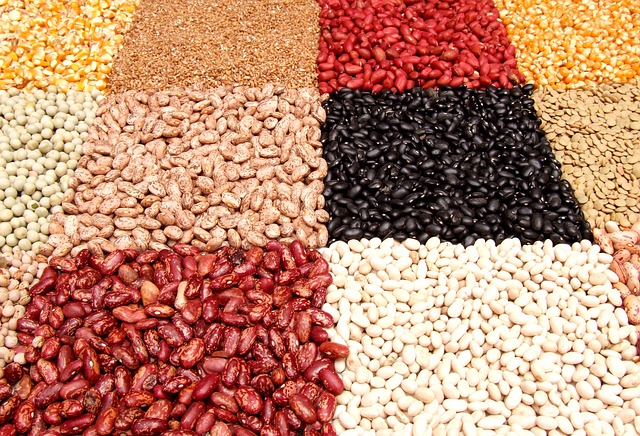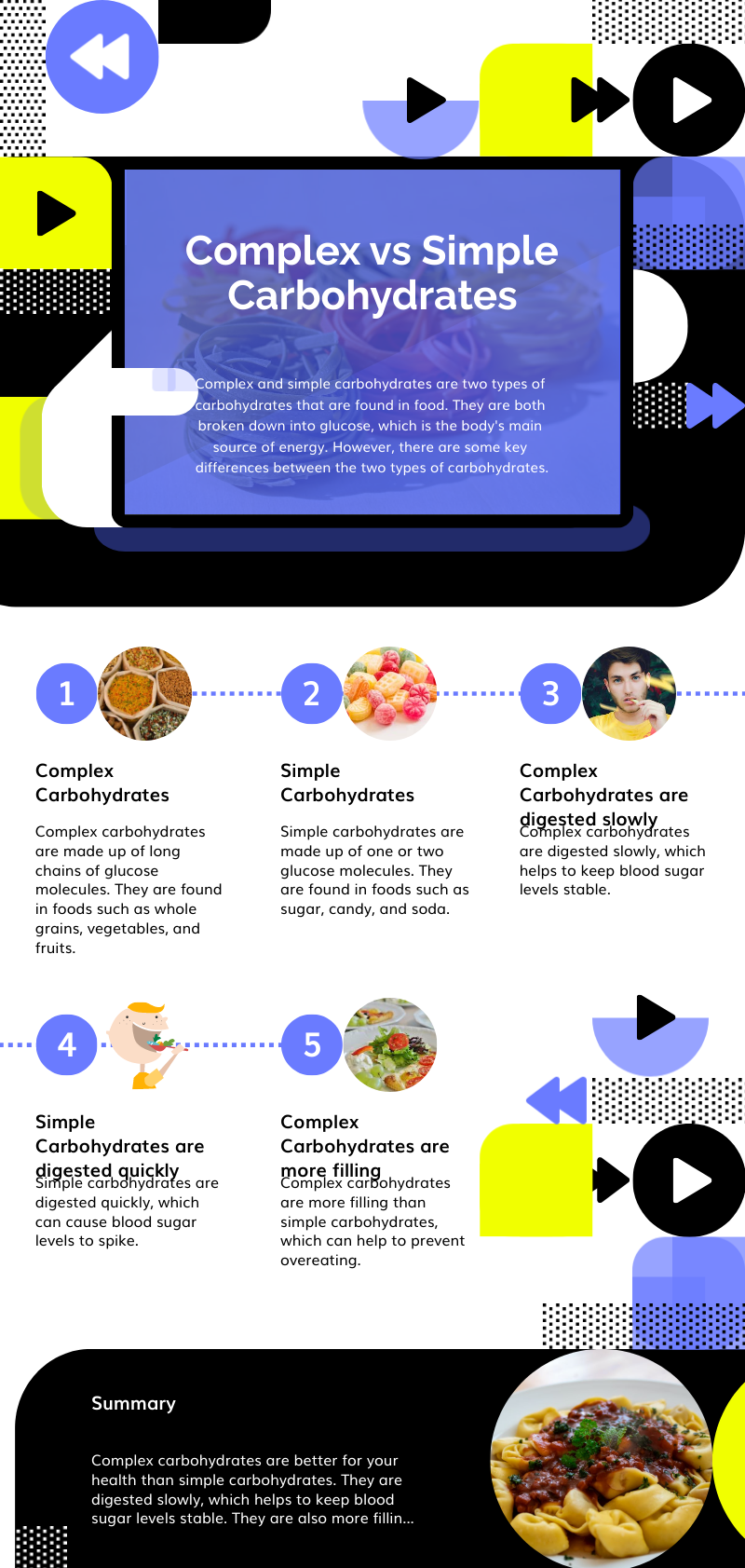Complex carbs have longer chains, taking more time to break down. Simple carbs have shorter chains, providing quick energy but less sustained benefits.
Did you know that the type of carbohydrates you consume can have a significant impact on your energy levels and overall health? When it comes to carbohydrates, there are complex and simple varieties, each with its own unique characteristics and effects on the body. Understanding the differences between complex and simple carbohydrates can help you make informed dietary choices that support your well-being. Let’s explore the distinctions and benefits of these two types of carbohydrates.
Key Takeaways:
- Complex carbohydrates take longer to digest and provide a more stable source of energy compared to simple carbohydrates.
- Simple carbohydrates are quickly digested and can lead to rapid spikes in blood glucose levels.
- Choosing nutrient-dense whole foods and limiting sugary and processed foods is crucial for maintaining a healthy diet.
- Complex carbohydrates, found in whole grains and legumes, offer added benefits like fiber, vitamins, and minerals.
- Both types of carbohydrates can be part of a healthy eating plan, but it’s important to consider their overall nutritional profile.
Understanding Carbohydrates
Carbohydrates are a major macronutrient found in a variety of food sources such as dairy products, fruits, vegetables, grains, and sweets. They are composed of fiber, starch, and sugar.
Simple carbohydrates are digested quickly and release glucose into the bloodstream rapidly, while complex carbohydrates are digested more slowly and provide a more gradual release of glucose.
Effects of Simple Carbohydrates

Consuming simple carbohydrates can have significant effects on our health and energy levels. Due to their quick digestion and absorption, simple carbohydrates can cause a rapid spike in blood glucose levels, providing a short-lasting source of energy. However, this sudden increase in blood sugar is often followed by a drop in energy levels.
Excessive consumption of simple carbohydrates, especially those from processed foods and added sugars, can have negative health implications. Here are some of the health risks associated with consuming too many simple carbohydrates:
- Weight gain: Simple carbohydrates are often calorie-dense and can contribute to weight gain when consumed in excess. These foods are typically low in fiber and do not provide a feeling of fullness, leading to overeating.
- Increased risk of cardiovascular disease: High intake of simple carbohydrates, particularly those from sugary beverages and refined grains, has been linked to an increased risk of heart disease and other cardiovascular issues.
- Disrupted blood sugar control: Simple carbohydrates can cause rapid fluctuations in blood glucose levels, which can interfere with the body’s ability to regulate blood sugar properly. This can increase the risk of developing conditions like insulin resistance and type 2 diabetes.
To illustrate the potential health implications of consuming simple carbohydrates, the table below provides a comparison of commonly consumed simple carbohydrate-rich foods and their corresponding health risks:
| Foods | Health Risks |
|---|---|
| Sugary beverages | Increased risk of obesity, type 2 diabetes, and tooth decay |
| Pastries and sweets | Weight gain, high blood sugar levels, and increased risk of chronic diseases |
| White bread and refined grains | Rapid rise in blood sugar, increased inflammation, and higher risk of heart disease |
| Processed foods with added sugars | Weight gain, metabolic dysfunction, and increased risk of chronic illnesses |
It is important to note that not all simple carbohydrates are inherently unhealthy. Natural sugars found in fruits and dairy products also fall under the category of simple carbohydrates but offer essential vitamins, minerals, and other nutrients. To promote overall health, it is crucial to prioritize whole foods and limit the consumption of foods with added sugars and refined grains.
Benefits of Complex Carbohydrates

Complex carbohydrates offer numerous benefits due to their longer digestion time and nutrient-rich composition. These carbs can be found in a variety of foods, including whole grains, legumes, fruits, and starchy vegetables. Incorporating complex carbohydrates into your diet can contribute to several aspects of your overall health and well-being.
Good Digestive Health
Complex carbohydrates, thanks to their high fiber content, promote good digestive health. They provide bulk to the stool, aiding in regular bowel movements and preventing constipation. Additionally, the fiber in complex carbs acts as a prebiotic, nourishing the beneficial bacteria in your gut and supporting a healthy gut microbiome.
Weight Management
Complex carbohydrates are an important component of a balanced diet for weight management. The high fiber content in these carbs helps you feel fuller for longer, reducing the likelihood of overeating. By providing sustained energy and preventing excessive hunger, complex carbohydrates can support healthy weight loss or maintenance.
Reduced Risk of Chronic Diseases
Evidence suggests that a diet rich in complex carbohydrates may help reduce the risk of chronic diseases such as type 2 diabetes and cardiovascular disease. The fiber, vitamins, and minerals found in complex carbs contribute to improved insulin sensitivity, lower blood cholesterol levels, and better overall heart health.
Examples of Complex Carbohydrate Foods
When incorporating complex carbohydrates into your diet, consider adding the following nutrient-dense foods:
- Whole grains like brown rice, quinoa, and whole wheat bread
- Legumes such as chickpeas, lentils, and black beans
- Fiber-rich fruits like apples, oranges, and berries
- Starchy vegetables including sweet potatoes, corn, and peas
By choosing these complex carbohydrate options, you can enjoy the numerous health benefits they offer while nourishing your body with essential nutrients.
Considering Overall Nutrition
When it comes to the nutritional value of carbohydrates, it’s important to look beyond the simple versus complex categorization and consider the overall nutritional profile of the food. While complex carbohydrates are generally considered healthier, it’s worth noting that some simple carbohydrates found in fruits and dairy products offer essential vitamins, minerals, and other nutrients.
To make the most nutritious choices, it’s key to prioritize whole, unprocessed foods and limit consumption of foods with added sugars and refined grains. Let’s delve into the benefits and implications of both simple and complex carbohydrates:
Benefits of Complex Carbohydrates
Complex carbohydrates, such as whole grains, legumes, and starchy vegetables, provide a steady release of energy due to their longer digestion time. They are also rich in fiber, vitamins, and minerals, making them an excellent choice for maintaining good digestive health and reducing the risk of chronic diseases like type 2 diabetes and cardiovascular disease.
Health Implications of Simple Carbohydrates
On the other hand, simple carbohydrates, especially those from processed foods and added sugars, can have detrimental effects on health. These carbs are quickly digested, leading to rapid spikes in blood glucose levels and a short-lasting energy boost followed by a drop in energy levels. Consuming too many simple carbohydrates can contribute to weight gain, increased risk of cardiovascular disease, and disrupted blood sugar control.
To highlight the differences between simple and complex carbohydrates, let’s take a closer look at some examples:
| Simple Carbohydrates | Complex Carbohydrates |
|---|---|
| Candy | Whole wheat bread |
| Sugary drinks | Brown rice |
| Syrups | Quinoa |
| Table sugar | Sweet potatoes |
| Products with added sugar (e.g., baked goods, cereals) | Black beans |
To make informed dietary choices, prioritize complex carbohydrates while understanding that certain simple carbohydrates from natural sources, like fruits and dairy products, can still offer valuable nutrients. The key is to strive for a balanced diet that includes whole, unprocessed foods and limits the consumption of foods with added sugars and refined grains.
Examples of Simple Carbohydrate Foods to Limit
When it comes to maintaining a healthy diet, it’s important to be mindful of your consumption of simple carbohydrates. These types of carbohydrates are quickly digested by the body, leading to rapid spikes in blood glucose levels. To help you make informed choices, here are some examples of simple carbohydrate foods to limit:
- Candy
- Sugary drinks
- Syrups
- Table sugar
- Products with added sugar such as baked goods and cereals
These types of foods often provide empty calories and lack essential nutrients. While they may offer a quick burst of energy, they can contribute to weight gain and have negative impacts on overall health. Limiting your intake of these simple carbohydrate sources can help promote a more balanced and nutritious diet.
Choosing Healthier Complex Carbohydrate Foods
When it comes to including carbohydrates in your diet, opting for healthier complex carbohydrate options can provide numerous benefits for your overall health. These foods are not only rich in essential nutrients but also offer a range of vitamins, minerals, and dietary fiber to support your well-being.
Here are some examples of complex carbohydrate foods that you can incorporate into your diet:
- Whole grains: Brown rice, quinoa, whole-wheat pasta, oats
- Fiber-rich fruits: Apples, berries, citrus fruits
- Fiber-rich vegetables: Broccoli, spinach, kale, Brussels sprouts
- Legumes: Lentils, chickpeas, black beans
These complex carbohydrate options are not only delicious but also offer a variety of health benefits. Whole grains provide sustained energy and are packed with fiber, which aids in digestion and can help to lower cholesterol levels. Fiber-rich fruits and vegetables are not only great sources of vitamins and minerals but also help to keep you feeling full and satisfied. Legumes, such as lentils and chickpeas, are not only a good source of complex carbohydrates but also provide plant-based protein and a wide range of nutrients.
By choosing these nutrient-dense complex carbohydrate foods, you can ensure that your body receives the necessary energy and essential nutrients it needs to thrive.
Impact on Blood Glucose Levels
When it comes to impacting blood glucose levels, complex carbohydrates and simple carbohydrates have distinct differences. The longer digestion time of complex carbohydrates results in a more gradual rise in blood sugar, while simple carbohydrates cause a rapid increase in blood glucose levels.
This variance in blood glucose response between complex and simple carbohydrates can have implications for energy levels and overall blood sugar control. Understanding this difference can help individuals make informed choices about their carbohydrate consumption.
To illustrate the contrasting effects on blood glucose levels, let’s take a look at a comparison of complex carbohydrates and simple carbohydrates:
| Complex Carbohydrates | Simple Carbohydrates |
|---|---|
| Whole grains | Table sugar |
| Legumes | Syrups |
| Fruits | Sodas |
As shown in the table above, complex carbohydrates are found in whole grains, legumes, and fruits, while simple carbohydrates are commonly found in table sugar, syrups, and sugary drinks like sodas. Each type of carbohydrate has a distinct impact on blood glucose levels.
By choosing complex carbohydrates over simple carbohydrates, individuals can help maintain stable blood sugar levels and promote sustained energy throughout the day.
Considerations for Weight Control
When it comes to weight control, the type of carbohydrates you consume can make a significant difference. Complex carbohydrates, with their higher fiber content and slower digestion, can be beneficial in managing weight. On the other hand, simple carbohydrates, particularly those found in processed and sugary foods, can have a negative impact on weight.
The Role of Complex Carbohydrates
Complex carbohydrates, such as whole grains, legumes, and starchy vegetables, provide several advantages for weight control. The fiber in these foods contributes to a feeling of fullness, which can help prevent overeating and promote satiety. Additionally, complex carbohydrates break down more slowly in the body, providing a steady release of energy and minimizing blood sugar spikes.
The Pitfalls of Simple Carbohydrates
Simple carbohydrates, found in foods like candy, sugary drinks, and baked goods, can be problematic for weight control. These foods often contain high amounts of added sugars and lack the fiber and nutrients found in complex carbohydrates. Because they are quickly digested, simple carbohydrates can lead to rapid fluctuations in blood sugar levels and cravings for more food, potentially contributing to overconsumption of calories.
To illustrate the differences between complex and simple carbohydrates in terms of weight control, let’s take a look at the following table:
| Complex Carbohydrates | Simple Carbohydrates |
|---|---|
| Whole grains | Candy |
| Legumes | Sugary drinks |
| Starchy vegetables | Baked goods |
As you can see, complex carbohydrate options like whole grains and legumes provide more nutritional value and are less likely to contribute to weight gain compared to simple carbohydrate choices like candy and sugary drinks.
By incorporating complex carbohydrates into your diet and reducing your consumption of simple carbohydrates, you can support your weight control efforts and promote overall health and well-being.
The Role of Carbohydrates in Overall Health

Carbohydrates are essential for energy, but choosing wisely matters. Simple carbs like sugar cause quick energy spikes, followed by crashes and potential health issues. Too many processed sugary foods can lead to weight gain, heart problems, and blood sugar issues.
In contrast, complex carbs in foods like whole grains provide steady energy. They’re rich in fiber and nutrients, promoting good digestion, weight control, and lowering the risk of diseases. While simple carbs like fruits are okay in moderation, focusing on whole, unprocessed foods with complex carbs is key for overall health and well-being. Making informed choices about carbs in our diet helps us stay healthy and energized.
To better understand the health implications of simple and complex carbohydrates, let’s take a look at a comparison table:
| Simple Carbohydrates | Complex Carbohydrates |
|---|---|
| Digested quickly | Digested more slowly |
| Rapid rise in blood glucose levels | Gradual rise in blood glucose levels |
| Short-lasting source of energy | Steady and prolonged release of energy |
| Can contribute to weight gain and increased risk of chronic diseases | Can support weight management and reduced risk of chronic diseases |
Conclusion
Understanding complex and simple carbs is crucial for a healthy diet. Complex carbs in whole foods like grains offer lasting energy, while simple ones in sugar give quick bursts but lack nutrients.
Prioritizing whole, nutrient-rich foods is vital. While complex carbs are generally healthier, some simple ones in fruits provide essential nutrients. Balancing and limiting added sugars is crucial for a healthy lifestyle. By focusing on whole, unprocessed complex carbs and considering individual needs, we can optimize overall health and well-being.
FAQ
What is the difference between complex and simple carbohydrates?
Complex carbohydrates take longer to digest and provide a more stable source of energy than simple carbohydrates.
What are simple carbohydrates?
Simple carbohydrates are digested quickly and release glucose into the bloodstream rapidly.
What are complex carbohydrates?
Complex carbohydrates are digested more slowly and provide a more gradual release of glucose.
What are the effects of simple carbohydrates?
Simple carbohydrates can cause a rapid spike in blood glucose levels and a short-lasting source of energy followed by a drop in energy levels.
What are the benefits of complex carbohydrates?
Complex carbohydrates provide a more steady and prolonged release of energy and are rich in fiber, vitamins, and minerals.
What should I consider when comparing simple and complex carbohydrates?
It is important to prioritize whole, unprocessed foods and limit the consumption of foods with added sugars and refined grains.
What are examples of simple carbohydrate foods to limit?
Candy, sugary drinks, syrups, table sugar, and products with added sugar such as baked goods and cereals.
What are healthier options for complex carbohydrates?
Whole grains, fiber-rich fruits, fiber-rich vegetables, and legumes are healthier options for complex carbohydrates.
How do complex and simple carbohydrates impact blood glucose levels?
Complex carbohydrates have a slower impact on blood glucose levels, while simple carbohydrates cause a rapid increase in blood glucose levels.
How do carbohydrates affect weight control?
Complex carbohydrates, with their higher fiber content and slower digestion, can contribute to a feeling of fullness and help with weight control.
What is the role of carbohydrates in overall health?
Carbohydrates provide energy for the body and can be part of a healthy eating plan when chosen wisely.
Source Links
- https://www.heart.org/en/healthy-living/healthy-eating/eat-smart/nutrition-basics/carbohydrates
- https://www.healthline.com/health/food-nutrition/simple-carbohydrates-complex-carbohydrates
- https://www.medicalnewstoday.com/articles/325171
Image Credits
Featured Image By – Ilo from Pixabay
Image 1 By – Hans Schwarzkopf from Pixabay
Image 2 By – Ariel Núñez Guzmán from Pixabay









